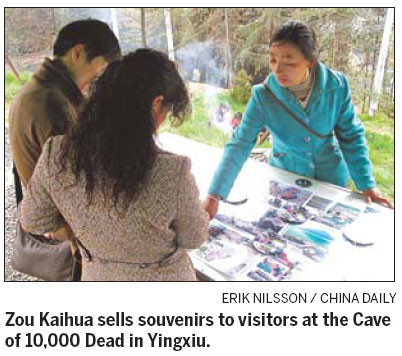Quake tourism helps survivors make a living
Zuo Kaihua makes her living memorializing the dead.
Since the 40-year-old Tibetan farmer's house was destroyed by the 8.0-magnitude Wenchuan earthquake and her land - located at the edge of what became a mass grave - was used for a museum site, she has been selling quake souvenirs at the gate of the cemetery in Sichuan province's Yingxiu township.
"We need money to live, so we set up this stall," she says.

She sells laminated quake photos, DVDs about the disaster and flowers to visitors to the Cave of 10,000 Dead. The site is the final resting place of at least 6,000 people - more than a third of the township's pre-quake population - interred in a cornfield to prevent epidemics.
The doorknob betrays Zuo's table's original function. She bought the door for 50 yuan ($7.74) when the prefabricated temporary houses were disassembled and residents started moving into government-subsidized 90-square-meter homes.
She flips through a packet of photos for customers. "You can see the road is broken here," Zuo says, tapping the image of a crumpled red truck.
"This is Yingxiu Primary School," she says, pointing to another picture. "It's gone."
She says she buys the photos for 60 yuan a set from a factory in Sichuan's Deyang city and sells them for 70 yuan.
She is among about half a dozen vendors with booths set up at the gate to the Cave of 10,000 Dead, some of which also sell Tibetan handicrafts.
"Business isn't as good this year as it was last year," she says. "I can earn several hundred yuan a month, 1,000 at best."
Her table is set up next to another door-turned-countertop that belongs to her sister-in-law Yao Xianqun.
The 44-year-old says she makes an average of 50 yuan a day. "The money isn't enough, but I have no other choice," she says.
Her husband earns about 100 yuan a day doing odd jobs in a power plant.
But Yao worries she and the other vendors might be pushed out by the private company that will sell the same souvenirs when it opens a store at the bottom of the mass grave's slope.
Yao says she considers herself lucky to be alive. She was buried in the quake and received neck injury treatment that would have cost 200,000 yuan, for free.
"If it weren't for the government's help, I would be dead," Yao says. "My mother and sister died."
Zuo is grateful her 10-year-old daughter and then-18-year-old son escaped from Yingxiu's schools.
"But my son is so traumatized. He refuses to set foot in any school now," Zuo says.
Zuo says she initially sold fruits, nuts and drinks.
"But my new house is farther away. It's hard to carry water and nuts so far," she says.
Zuo says about 40 tourists visit the memorial every day. "They come here to understand what happened and to see how the survivors are living," she says. "It's a form of patriotic education. Many teachers bring their students here to see how the people of Yingxiu have stood up and put the pieces back together."
Among these curious outsiders is Hong Yaoxian, a 59-year-old professor from the provincial capital Chengdu.
"I came here to really understand," Hong says. "I bought a DVD so I could take it back for my family to watch, since they couldn't be here today."
A bus pulls up and pours out 28 adults and 10 children ages 1 to 17. They are the employees of Light Optics Instruments Co, Ltd, and their children, on a tour that is a staff reward for surpassing the annual marketing sales goal early, the company's general manager Huang Zhong says.
He says the memorial is the trip's first stop. The group was set to visit Mount Qingcheng's temples the following day.
Yingxiu's chief of government affairs Xu Caiying says quake tourism has become a pillar industry of the town.
"The graveyard is meant for memorializing, not for tourism. The museum is meant for both," she says. "Still, people come to the cemetery because they're curious.
"Visitors promote Yingxiu and make it more famous. And they boost residents' incomes."




















